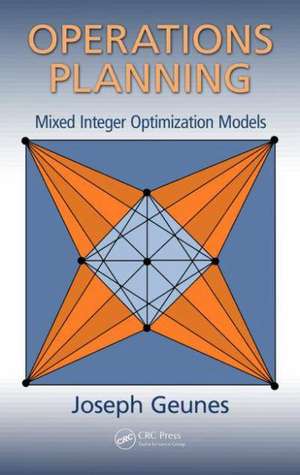Operations Planning: Mixed Integer Optimization Models: Operations Research Series
Autor Joseph Geunesen Limba Engleză Hardback – 18 sep 2014
Each of the models and solution methods presented is the result of high-impact research that has been published in the scholarly literature, with appropriate references cited throughout the book. The author highlights the close relationships among the models, examining those situations in which a particular model results as a special case of other related models or how one model generalizes another. Understanding these relationships allows you to more easily characterize new models being developed through their relationships to classical models.
The models and methods presented in the book have widespread application in operations planning. It enables you to recognize the structural similarities between models and to recognize these structural elements within other contexts. It also gives you an understanding of various critical operations research techniques and classical operations planning models, without the need to consult numerous sources.
Preț: 847.31 lei
Preț vechi: 1140.24 lei
-26% Nou
Puncte Express: 1271
Preț estimativ în valută:
162.18€ • 176.23$ • 136.32£
162.18€ • 176.23$ • 136.32£
Comandă specială
Livrare economică 31 martie-14 aprilie
Doresc să fiu notificat când acest titlu va fi disponibil:
Se trimite...
Preluare comenzi: 021 569.72.76
Specificații
ISBN-13: 9781482239904
ISBN-10: 1482239906
Pagini: 218
Ilustrații: 39 black & white illustrations, 1 black & white tables
Dimensiuni: 156 x 234 x 18 mm
Greutate: 0.43 kg
Ediția:1
Editura: CRC Press
Colecția CRC Press
Seria Operations Research Series
ISBN-10: 1482239906
Pagini: 218
Ilustrații: 39 black & white illustrations, 1 black & white tables
Dimensiuni: 156 x 234 x 18 mm
Greutate: 0.43 kg
Ediția:1
Editura: CRC Press
Colecția CRC Press
Seria Operations Research Series
Cuprins
Introduction and Purpose. The Knapsack Problem. Set Covering, Packing, and Partitioning. The Generalized Assignment Problem. Incapacitated Economic Lot Sizing. Capacitated Lot Sizing. Discrete Facility Location Problems. Vehicle Routing and Traveling Salesman Problems.
Recenzii
"The book under review gathers several of the most useful models for optimization with widespread applicability in operation planning. ... With the exception of Chapter 1, each chapter contains several numerical examples and ends with a set of exercises. This approach makes the book very helpful for a graduate course on mixed integer optimization models for non-mathematically oriented, business administration students. With its precise references to a bibliography of 120 titles ranging from 1954 to 2010, the book can serve well as a reference for researchers in the domain of operations planning."
—Mihai Cipu (Bucureşti), Zentralblatt MATH, 1327
"The book provides a technically sound, yet very readable, description of various state-of-the-art mathematical programming techniques that can be used to tackle relevant operations planning problems. In early chapters, important mathematical programming concepts are introduced in the context of archetypical optimization problems, such as the knapsack and the set covering problem. In later chapters, the book covers all classical operations planning problems; i.e., problems in production planning (single and multi-stage), distribution planning, location, and routing. Although none of the material is really new, it is nice to have it well-presented in a single book instead of scattered among various journal papers. Where appropriate, the material is illustrated with meaningful numerical examples and figures. Moreover, every chapter is concluded with challenging exercises, making this book suitable for courses at the advanced undergraduate or graduat level. Because it covers a wide range of techniques, the book can also be used to introduce readers to various concepts in mathematical programming, even if they don’t have a particular interest in operations planning. In that case, the specific operations planning problems merely serve to illustrate the techniques."
—Albert P.M. Wagelmans, Erasmus University Rotterdam, The Netherlands
—Mihai Cipu (Bucureşti), Zentralblatt MATH, 1327
"The book provides a technically sound, yet very readable, description of various state-of-the-art mathematical programming techniques that can be used to tackle relevant operations planning problems. In early chapters, important mathematical programming concepts are introduced in the context of archetypical optimization problems, such as the knapsack and the set covering problem. In later chapters, the book covers all classical operations planning problems; i.e., problems in production planning (single and multi-stage), distribution planning, location, and routing. Although none of the material is really new, it is nice to have it well-presented in a single book instead of scattered among various journal papers. Where appropriate, the material is illustrated with meaningful numerical examples and figures. Moreover, every chapter is concluded with challenging exercises, making this book suitable for courses at the advanced undergraduate or graduat level. Because it covers a wide range of techniques, the book can also be used to introduce readers to various concepts in mathematical programming, even if they don’t have a particular interest in operations planning. In that case, the specific operations planning problems merely serve to illustrate the techniques."
—Albert P.M. Wagelmans, Erasmus University Rotterdam, The Netherlands
Descriere
A reference for those working at the interface of operations planning and optimization modeling, this book blends essential theory and powerful approaches to practical operations planning problems. Starting with the Knapsack Problem, it presents a set of classical optimization models with widespread application in operations planning. The discussion of each of these classical models begins with the motivation for studying the problem as well as examples of the problem’s application in operations planning contexts. The book explores special structural results and properties of optimal solutions that have led to effective algorithmic solution approaches for each problem class.












